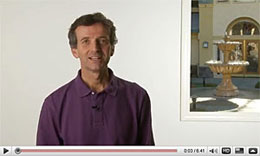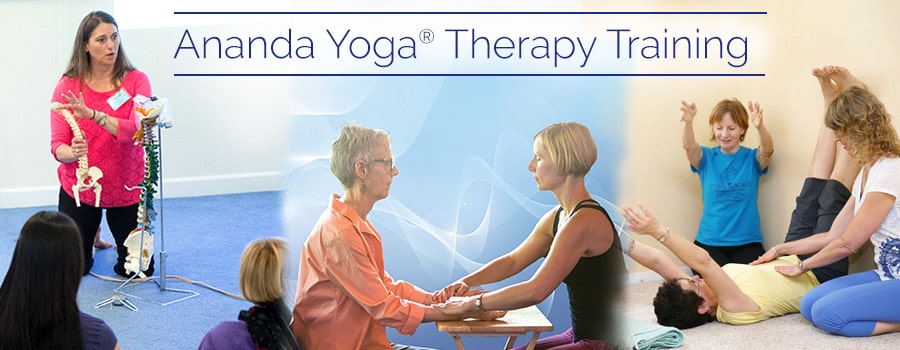SYLLABUS
Ananda Yoga® Therapy Training:
Psychology & Mental Health
Exploring Yogic, Ayurvedic and Western Perspectives
We are not currently accepting new students in the Ananda Yoga Therapy Training
Course Hours: Total = 42 (Residential and Distance)
- Residential: 29
- Distance: 13 (as Home Practicum)
- Practicum: 13 Distance (as Home Practicum)
Prerequisites
- Enrollment in the Ananda Yoga® Therapy Training program, AND,
- Ananda Yoga® Therapy Training: Principles, AND,
- Ananda Yoga® Therapy Training: Ayurveda, AND
- Ananda Yoga® Therapy Training: Health Challenges-1
Teaching Format
This is a 5-day residential course which includes a combination of lecture, discussion, case studies in large and small groups, and practicum (distance, as Home Practicum Assignment).
Faculty
Therese Smith MA, MFT, Ananda Yoga Teacher, Phoenix Rising Yoga Therapist
Nayaswami Mangala Loper-Powers RN, MN, NP, E-RYT 500, Ananda Yoga Therapist, C-IAYT, Clinical Ayurvedic Specialist
Nayaswami Mantradevi LoCicero, Ananda Yoga and Meditation Teacher, Spiritual Counselor
Required Texts/Reading Materials
- McCall, Timothy B. Yoga as Medicine: The Yogic Prescription for Health & Healing. New York: Bantam, 2012.
- Forbes, Bo. Yoga for Emotional Balance, Shambala, 2011.
- Frawley, David, Ayurveda & the Mind: the Healing of Consciousness, Lotus Press, 1996.
- Ananda Yoga Therapy Training: Psychology & Mental Health Manual. The Expanding Light.
Recommended Texts
Emerson, D., Hopper, E., Overcoming Trauma through Yoga, North Atlantic Books, 2011.
Nurrie Stearns, M, and Nurrie Stearns, R, Yoga for Emotional Trauma: Meditations and Practices for Healing Pain and Suffering, New Harbinger, 2013.
Weingraub, A. Yoga for Depression, Broadway Books, 2004.
Course Description
Yoga therapy has proved helpful for many chronic mental health conditions, and we explore these with an overall orientation to the reality of body-mind integration. This course covers a multi-dimensional view of psychology and mental health, from Western, Ayurvedic, Yogic and Subtle Energy perspectives, which are addressed to guide the therapist's choice of interventions. Case studies are presented to provide time in practical application of the concepts in class. Therapeutic skills for communicating with and teaching clients are taught and practiced in case study sessions. Also covered are working therapeutically with groups, practicing ethically, and how to develop and use referral networks with mental health practitioners.
Learning Objectives
At the end of this course, students will:
- Know basic pathophysiology, symptoms, treatments (including medications) and medical terminology of a variety of common mental health conditions, ranging from psychological distress to psychiatric conditions, including how they impact a person’s life physically, mentally, emotionally, and spiritually.
- Know how to and demonstrate the ability (via case studies) to incorporate any contraindications related to mental health conditions into the development of a yoga therapy plan for clients.
- Know how developmental models of human development and influences of familial, social, cultural, and religious conditioning influence mental health conditions and healing.
- Know how Yogic and Ayurvedic views of the mind and personality can help the yoga therapist to create appropriate yoga therapy plans for those with a variety of psychological and mental health conditions.
- Know and be able to demonstrate good communication skills, including listening, presence, directive and non-directive dialogue; how to set appropriate therapeutic boundaries.
- Know how to do a basic evaluation of a person’s mental and emotional dimensions of well-being, and when it is appropriate to refer to a mental health professional.
- Know how to and be able to demonstrate (via case studies) the ability to apply appropriate yoga therapy to those with common mental health conditions, and how to collaborate with mental health practitioners as needed.
- Know effective teaching methods and how to adapt to different styles of learning.
- Know therapeutic ways to develop and manage group classes for people with these psychological/mental health conditions.
Subject Matter / IAYT Competencies covered
Category 1.1. Yoga Teachings and Philosophy
1.1.1 Familiarity with the evolution of the teachings and philosophy of the yoga tradition and its relevance and application to yoga therapy, including teachings from Vedic and post-Vedic periods, Samkhya,Yoga,Tantra, and Ayurveda.
Examples of concepts and models from the above teachings and philosophy relevant to yoga therapy, include but are not limited to,
a. tanmatra/bhuta/indriya (subtle element/gross elements/senses);
b. purusha/prakrti (consciousness/material world);
c. pancamaya kosha (dimensions of the human system);
d. guna (fundamental forces of nature); and
e. duhkha (suffering/discomfort).
Category 1.2. Yoga and the Mind
1.2.1 Knowledge of yoga perspectives on the structure, states, functioning, and conditions of the mind, including, but not limited to,
1.2.1.1 drashtr (seer), drshya (seen);
1.2.1.2 antahkarana citta (consciousness), buddhi (intellect), ahamkara (ego), manas (mind);
1.2.1.3 citta vrtti (activities of the mind), citta parinama (structural changes in the mind), vyutthana/nirodha (mind's potential for distraction and focus);
1.2.1.4 artha (cognition), bhava (mood), svabhava (inborn nature), vasana (residue of experience), samskara (conditioned pattern of thinking and behavior); and
1.2.1.5 states of mind: mudha (stupefied/dull), kshipta (disturbed), vikshipta (alternating between distraction and focus), ekagrata (one-pointed), nirodha (focus enveloped/held/ restrained), vaishvanara (waking), taijasa (dream), prajña (deep sleep), turiya (beyond).
1.2.2 Knowledge of yoga perspectives on distracted/disturbed conditions of mind and their expressions as expressed in such texts as the Yoga Sutras, the Bhagavad Gita, and other texts, including but not limited to,
1.2.2.1 klesha (affliction);
1.2.2.2 lobha, krodha, and moha (greed, anger, attachment);
1.2.2.3 duhkha and daurmanasya (suffering/discomfort and negative attitude/thinking), sarupyam (identification with the contents of the mind or seer taking the same form as the mind); and
1.2.2.4 antaraya (obstacles to progress in yoga).
Category 1.3. Framework for Health and Disease
1.3.1 Knowledge of the basic perspectives on health and disease from yoga and Ayurveda relevant to the practice of yoga therapy, including the concepts of
1.3.1.1 panca maya (kosha) (fundamental structure of the human system);
1.3.1.2 subtle anatomy;
1.3.1.3 tri-dosha (effect of the elements on the physical body);
1.3.1.4 tri-guna (effect of sattva (equilibrium), rajas (activity), tamas [(inertia]);
1.3.1.5 prakrti/vikrti (dosha constitution at birth/imbalance of the dosha currently expressed in the body);
1.3.1.6 ama (undigested food, emotions, etc. accumulated in the body);
1.3.1.7 agni (internal fire(s) and their contribution to health);
1.3.1.8 prana vayu (prana, apana, vyana, udana,samana);
1.3.1.9 prana prakopa (disturbance of the vayu);
1.3.1.10 surya/chandra (sun/moon);
1.3.1.11 brmhana/langhana (expansion/contraction); and
1.3.1.12 vyuha model: heya (the symptoms), hetu (the causes), hana (the goal),upaya (the tools).
Section 2. Biomedical and Psychological Foundations
Category 2.1. Anatomy and Physiology
Suggested Guidelines: 90 hours minimum for this category
2.1.1 Knowledge of human anatomy and physiology, including all major systems of the body and their interrelationships, as relevant to the work of a yoga therapist.
2.1.3 Knowledge of common pathologies and disorders of all the major systems, including symptoms, management, illness trajectories, and contraindications,
as relevant to the work of a yoga therapist.
Category 2.2. Additional Biomedical Knowledge
2.2.1 Familiarity with commonly used drugs and surgical procedures, as relevant to the work of a yoga therapist.
2.2.2 Familiarity with common medical terminology.
2.2.3 Knowledge of how to reference current healthcare information relevant to the work of a yoga therapist, including pathologies, disorders, drugs,
and surgical procedures, as relevant to the work of a yoga therapist.
Category 2.3. Psychology and Mental Health
2.3.1 Basic knowledge of commonly occurring mental health conditions— from psychological distress to psychiatric conditions—their symptoms, and common approaches/interventions, as they relate to the work of a yoga therapist.
2.3.2 Basic knowledge of psychological concepts and terminology, including mood,
cognition, behavior, and personality, as relevant to the work of a yoga therapist.
Category 2.4. Additional Knowledge
Suggested Guidelines: 10 hours minimum for this category
2.4.1 Familiarity with models of human development, including developmental stages, lifecycles, and personality, and their importance to medical and psychological health and well-being.
2.4.2 Familiarity with the influence of familial, social, cultural, and religious conditioning on mental and medical perspectives of health and healing.
Category 2.5. Body and Mind Integration
2.5.1 Knowledge of the interaction of the body, breath, mind, intellect, and emotions in health and well-being.
Section 3. Yoga Therapy Tools and Therapeutic Skills
Category 3.1. Yoga Practices
3.1.1 In-depth knowledge of the application of yama and niyama.
3.1.2 In-depth knowledge of the range of yoga practices and their potential therapeutic effects for common conditions Practices may include, but are not limited to,
3.1.2.1 asana (postures);
3.1.2.2 pranayama (regulated breathing);
3.1.2.3 meditation and relaxation techniques such as bhavana (visualization), mantra (recitation), and ritualized activities such as nyasa and mudra; and
3.1.2.4 vihara (lifestyle modifications) including basic yogic dietary concepts.
3.1.3 In-depth knowledge of contraindications of yoga practices for specific conditions and circumstances.
Category 3.2. Basic Principles of the Therapeutic Relationship
3.2.1. In-depth knowledge of, and observed capacity for, well-developed communication skills: listening, presence, directive and non-directive dialogue.
3.2.2. Demonstrated ability to recognize, adjust, and adapt to specific client/student needs in the evolving therapeutic/professional relationship.
3.2.3. Demonstrated ability to recognize and manage the subtle dynamics inherent in the therapist/client relationship.
3.2.4. In-depth Knowledge of the scope of practice of yoga therapy and how to assess the need for referral to other professional services.
Category 3.3. Principles and Skills for Educating Clients/Students
3.3.1. In-depth knowledge of and demonstrated ability to implement effective teaching methods, adapt to unique styles of learning, provide supportive and effective feedback, acknowledge the client's/student's progress, and cope with unique difficulties/successes.
3.3.2. In-depth knowledge of and demonstrated ability to transmit the value of self-awareness and self- responsibility throughout the therapeutic process.
3.3.3. In-depth knowledge of and demonstrated ability to develop and adjust appropriate practice strategies to the client/student.
Category 3.4. Principles and Skills for Working with Groups
3.4.1. Basic knowledge of and demonstrated ability to design, implement, and evaluate group programs.
3.4.2. Familiarity with group dynamics and techniques, including communication skills, time management, and the establishment of priorities and boundaries, as well as techniques to address the specific needs of individual participants, to the degree possible in a group setting.
Section 4. Practicum
Category 4.1. Provide Yoga Therapy
4.1.1 Demonstrated ability to conduct intake and assess the client/student, including
4.1.1.1 Taking a history of the client and his/her condition(s); and
4.1.1.2 Assessing the current condition using the tools relevant to the yoga therapist, including an evaluation of the physical, energetic, mental, emotional, and spiritual dimensions of well-being.
4.1.2 Demonstrated ability to elicit the goals, expectations, and aspirations of the client/student.
4.1.3 Demonstrated ability to integrate information from the intake, evaluation, and observation to develop a working assessment of the client's condition, limitations, and possibilities.
4.1.4 Demonstrated ability to apply knowledge of how to determine which aspects of the client/student's conditions, goals, and aspirations might be addressed through yoga therapy.
4.1.5 Demonstrated ability to identify priorities and set both long- and short-term goals with the client/student.
4.1.6 Demonstrated ability to apply knowledge of pacification, purification, and strengthening strategies.
4.1.7 Demonstrated ability to apply knowledge of strategies that address common disorders and pathologies of the major human systems and common mental health conditions, as well as other goals and aspirations of the student as
4.1.8 Demonstrated ability to apply knowledge of how to combine intake, evaluation, observations, and working assessment to develop an appropriate practice or session strategy for individual clients/students as well as group classes, taking into consideration the holistic nature of the individual.
4.1.9 Demonstrated ability to apply knowledge of how to choose and prioritize the use of yoga tools and techniques, including selecting, sequencing, adapting, and modifying yoga practices appropriate to the needs of clients.
4.1.10 Demonstrated ability to teach or deliver the appropriate practices for individuals as well as groups, taking into consideration the assessment of their conditions, limitations, possibilities, and the overall practice strategy.
4.1.11 Demonstrated ability to facilitate the client/student's experience of the practice, including
4.1.11.1 providing instruction, demonstration, education of the client/student using multimodal strategies of education such as auditory, visual, and kinesthetic learning tools; and
4.1.11.2 providing supportive strategies for the client/student to actively participate in his/her practice, such as a means to remember his/her practice (e.g., auditory and visual tools).
4.1.12 Demonstrated ability to develop and maintain therapeutic relationships including
4.1.12.1 fostering trust by establishing an appropriate therapeutic environment through privacy, confidentiality, and safety; and
4.1.12.2 practicing effective, client/student-centered communication based upon a respect for, and sensitivity to, individual, familial, cultural, social, ethnic, and religious factors.
4.1.13 Demonstrated ability to provide follow up and re-planning, including
4.1.13.1 gathering feedback, re-assess, and refine the practice and to determine short-term and long-term goals and priorities;
4.1.13.2 addressing new and changing conditions, goals, aspirations, and priorities of the student/client and to provide appropriate support; and
4.1.13.3 providing appropriate closure for the therapy sessions.
Section 5. Professional Practice
Category 5.1. Ethical Principles
5.1.1 In-depth knowledge of yoga practices and methods for self-inquiry related to establishing, practicing, and maintaining ethical principles.
5.1.2 In-depth knowledge of generally accepted ethical principles of health care codes of conduct and yoga's ethical principles.
5.1.4 In-depth knowledge of the scope of practice of yoga therapy, resulting in the demonstrated ability to discern the need for referral to other modalities.
5.1.5 Knowledge of the extent of one's own individual training, skills, and evolving experience in yoga therapy, and knowledge of the importance of practicing within such parameters.
Category 5.2. Legal, Regulatory, and Business Issues Pertaining to Yoga Therapy
5.2.1 Knowledge of current relevant local, state, and national laws and regulations impacting the work of a yoga therapist.
Category 5.3. Relationships with Peers, Mentors, Clinicians, and
Organizations
5.3.1 Basic knowledge of other healthcare fields and their potential role in and relevance to the work of a yoga therapist.
5.3.2 Basic knowledge of how to establish, maintain, and utilize a referral network of peers and related healthcare practitioners and organizations.
5.3.3 Basic knowledge of how to develop and maintain ongoing collaborative relationships.
Category 5.4. Personal and Professional Development and
Continuing Education
5.4.1 Knowledge of the fundamental value of ongoing personal practice, long-term mentorship, and skills maintenance/development through continuing education.
5.4.2 Knowledge of when and how to seek advice and support for case consultation, educational advancement, and personal practice.
Course Completion Requirements
- Attendance at all classes.
- Completion of all assigned readings. (see below)
- Participation in class discussions and activities (including case studies, review sessions, practicums). Participation needs to reflect that the student has learned and begun to assimilate the information from their assigned readings. (The faculty will be assessing whether the student has achieved the level of knowledge and appropriate application of that knowledge according to the IAYT Competencies that apply.)
- Satisfactory performance on in-class (closed-book) Quizzes. This will indicate an achievement of the stated course Learning Objectives. Students will be given Answer Keys to the Quizzes immediately after taking them, and there will then be time for further Q & A and group discussion with faculty.
- During in-class case studies, students must provide yoga therapy interventions in a safe and appropriate manner, in accordance with the IAYT Competencies for providing yoga therapy (Section 4, Category 4.1 ), as determined by supervising faculty. Students are given immediate feedback from faculty and peers on all aspects of their observational, assessment, decision-making, planning, teaching and record-keeping skills.
- Satisfactory completion of the Home Practice Assignment. (see below) Students are given written feedback by supervising faculty, along with an offer to speak in person or by phone in addition. If the expected standard of satisfactory performance (set by IAYT Standards and Competencies) is not met, then students will be given additional guidance and assignments as needed until they can demonstrate the expected competency.
- If any of the above requirements or expectations are not met, the student will be counseled and/or given additional assignments in order to help them be able to demonstrate satisfactory performance.
Reading Assignments
- McCall, Timothy B. Yoga as Medicine: The Yogic Prescription for Health & Healing. New York: Bantam, 2012: Chapter 8, Anxiety & Panic Attacks.
- Frawley, David, Ayurveda & the Mind: the Healing of Consciousness, Lotus Press, 1996: Foreward, pp: 1-10, 43-57, 125-142, 149-168, 223-235, Ch. 16 & 17, p. 314-316.
- All the contents of the Ananda Yoga Therapy Training: Psychology & Mental Health Manual. The Expanding Light, 2013.
Ananda Yoga Therapy Training
- Overview
- Flow Chart of Ananda Yoga® Therapy Training Courses
- Course Syllabi
- Tuition Costs
- Ananda Yoga® Therapy Training Courses Scheduled
- Frequent Questions
- Instructors
- Apply for Level 1
- Student Handbook with Costs
- Bridge to Ananda Yoga
Upcoming Courses in date order
- Bhagavad Gita Retreat
- The Essence of the Yoga Sutras According to Paramhansa Yogananda
- Ananda Meditation® Teacher Training - In Person
- Advanced Pranayama
- Ananda Yoga® Assistantship
- Ananda Yoga® Therapy Training: Principles
- Ananda Yoga® Advanced Training: Therapeutic Yoga for Seniors and Bone Strength
- Restorative Ananda Yoga® Teacher Training - In Person
- Ananda Yoga® Therapy Training: Musculoskeletal–1
- Ananda Yoga® Therapy Training Online: Ayurveda
- Ananda Yoga® Therapy Training Online: Health Challenges–1
- Ananda Meditation® Solutions
- Ananda Spiritual Counseling® Training - In Person
- Ananda Yoga® Therapy Training: Musculoskeletal–2
- Ananda Yoga® Therapy Training Online: Health Challenges–2
- Ananda Yoga® Therapy Training: Psychology and Mental Health
- Ananda Yoga® Therapy Training: Holistic Health Therapist Training
Nursing CEU Eligible: details coming

How to Choose a
Yoga Teacher Training Program

“My 4 weeks of Ananda Yoga Teacher Training was one of the most fulfilling and spiritually transforming periods in my life. All of the faculty, along with the entire Ananda community, were very supportive and nurturing.” – R. F., Lake Bluff, IL.

Testimonial for the Ananda Yoga Therapy Training Program
“The program is all embracing ˜ asana, ayurveda, chakras, special health issues touching on body, mind, and spirit. The instructors were wonderful, knowledgeable, supportive, and enthusiastic.” – T.C., CA.







The yoga therapy components of these courses are based on our accreditation by IAYT, not derived from our status as an RYS with Yoga Alliance Registry.


CONNECT
14618 Tyler Foote Rd
Nevada City, California 95959
Toll free 800-346-5350
Outside US 530-478-7518
LEARN MORE
SUBSCRIBE
Receive uplifting emails with inspirational content and news about our retreat programs, travels, and trainings.
















